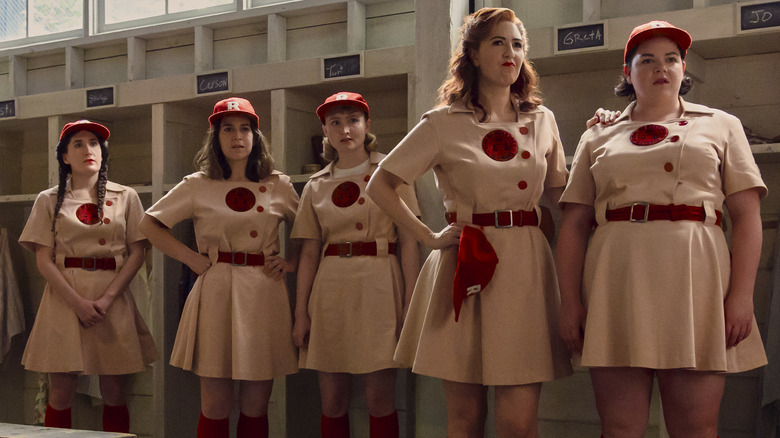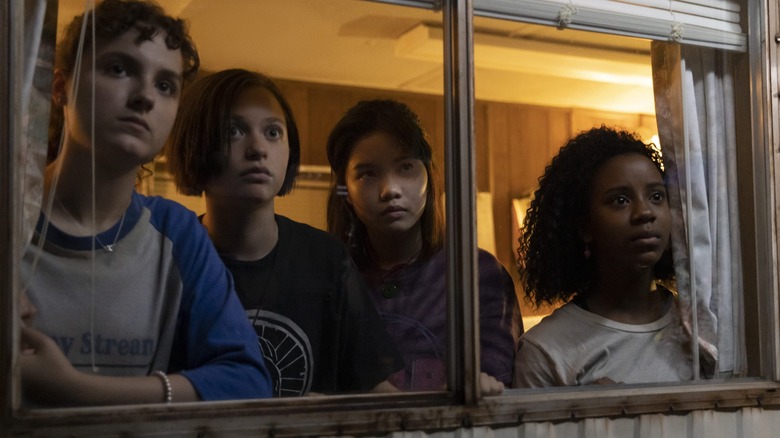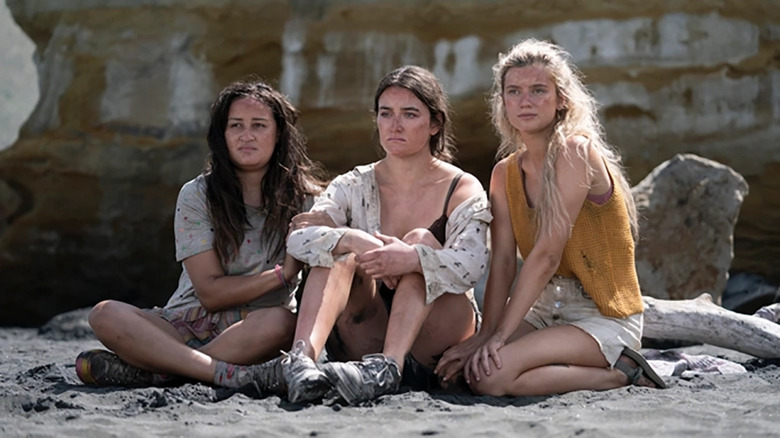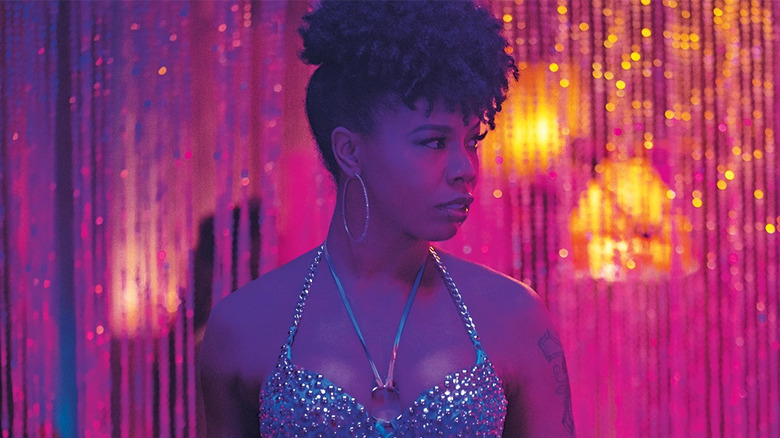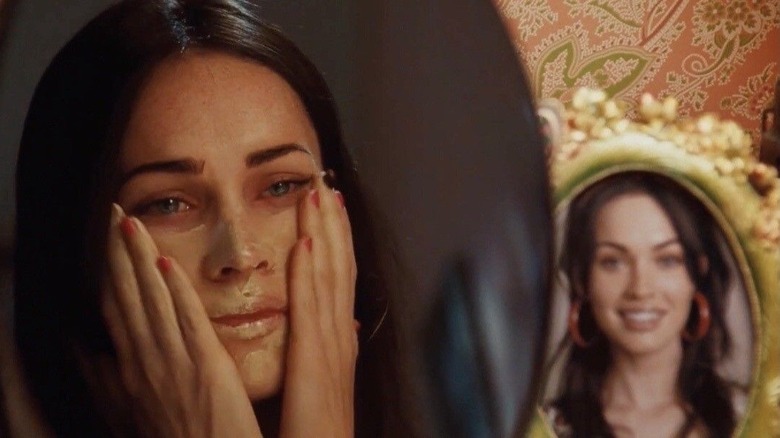Let's Not Mince Words: Canceling A League Of Their Own Due To Focus Group Feedback Is Homophobic
One of the best TV shows of 2022 was Will Graham and Abbi Jacobson's adaptation of "A League of Their Own" for Prime Video, a delightful look at the All-American Girls Professional Baseball League birthed during World War II. While based on the groundbreaking film of the same name starring Geena Davis, Tom Hanks, Rosie O'Donnell, Madonna, and Lori Petty, the Prime Video series was a more inclusive, historically accurate look at the real events that inspired the original. Meaning, many of the players are openly, canonically gay, and the series doesn't shy away from the ways racism pushed extremely talented Black women off the field.
Completely ignoring the cultural and societal importance of a story like this, "A League of Their Own" is also one hell of an underdog sports series. The ensemble cast is pitch-perfect, each episode is filled with snappy writing, and the compelling story has plenty to say, beyond course-correcting history. This is why it was such a gut punch to learn that "A League of Their Own" will be coming to an end after an already-shortened season 2. So, what the hell happened?
According to a truly incredible article in The Hollywood Reporter, it looks as if "A League of Their Own" was given the axe due to poor focus group performance. Despite positive reviews from critics and audiences alike, as well as nabbing a GLAAD Media Award for Outstanding New TV Series, the show's fate appears to have been dictated by the opinions of people who more than likely would have never watched the show in the first place.
The trouble with focus groups
Focus groups are demographically diverse groups that come together to test a product or give general feedback. On paper, it sounds like a great idea to get a variety of different perspectives in a room to provide input, but in execution, focus groups have a lot of problems. From a sociological perspective, participants tend to want to appease the moderator, which can lead to inaccurate data. Additionally, if the group is taking place in-person, folks might shift their opinions or feelings based on the group at large, experiencing a small-scale version of the groupthink phenomenon.
While focus groups try to be as diverse as possible, factors like "people who are willing to show up to a conference room to make $50 and get a free boxed lunch" aren't taken into account when assessing data. Is this really a snapshot of the public at large, or just who happened to be available? When it comes to film and television though, the issues are even more complicated.
Studios are always chasing projects that can appease the four main quadrants of an audience; both male and female (even though gender is not binary, but whatever) and both over and under-35 years old. Quite frankly, projects are usually more exciting when they aren't trying to appeal to as many people as possible because otherwise, the result is traditionally a sanitized tale geared toward the sensibilities of the dominant power in American culture — cisgender, straight, white, Christian, middle-class, men.
Here's the thing; most movies and shows do not appeal to four-quadrant audiences, and there's nothing wrong with that! What's wrong is studios using biased focus group data to justify canceling projects that happen to be centered on marginalized communities.
Pushing back isn't enough
For what it's worth, The Hollywood Reporter piece stated that "A League of Their Own" co-creator Will Graham pushed back on Amazon regarding the data, and the streamer reportedly "dropped the system of ranking shows based on audience scores," but it sounds like at that point, it was too little too late. The show had yet to be renewed for a second season, and the truncated promise of four episodes feels a lot like a consolation prize for actually interrogating the focus group data. It's like when teachers give students extra credit for finding mistakes in the homework they assigned. It's incredibly frustrating, but sadly, totally unsurprising. Marginalized people are made to feel thankful for the scraps those at the top of the ladder are willing to drop, and ungrateful for daring to vocalize when it's not enough.
And yet, despite the pushback, despite the grassroots #MoreThanFour campaign from fans to extend "A League of Their Own," the series hasn't been graced with any additional episodes. Things could obviously change after the publication of this article, but from what I've seen, I'm not holding my breath. "A League of Their Own" isn't the only queer women-centered show Prime Video has canceled too soon, with last year's "Paper Girls" and "The Wilds" both kicked to the curb. All three shows appeal to wildly different audiences, unified only by their queer female characters that aren't presented in a way that can be fetishized by cis, straight men.
And yet, all three are meeting a similar fate, seemingly due to a homophobic standard of practice like focus group testing.
The data studios want doesn't exist
A few years ago I was in a pitch meeting about a coming-of-age film centered on a group of queer kids and their token straight friend. The producers loved it ... until a number cruncher chimed in and said "the data doesn't support a guarantee the film would be a hit," and recommended that the company pass on my script. My response was firm, and likely put me on the bad side of the company for good: "The data doesn't support the film's success because the data doesn't exist."
The core problem with looking at gobs of data and treating it as gospel is that it doesn't account for nuance or the implicit biases that could exist within the group. If a bunch of lesbians were brought in and found the "A League of Their Own" to be problematic, then sure, go back to the drawing board. But if the room is littered with MAGA-obsessed weirdos, of course, they're going to hate the show! The phrase "audiences found queer stories off-putting" in reference to "A League of Their Own" is absolute B.S., because the show's audience doesn't feel that way. The show's actual audience is why every gay bar in America was filled with people in Rockford Peaches outfits for Halloween last year. The show's actual audience has been screaming online for weeks about a renewal.
The precious data these execs are frothing at the mouth for doesn't exist, because it's not being sought out. They're making decisions based on feedback from people who would have changed the channel during an ad for the series if it appeared organically and then acting surprised when it doesn't work.
We're conditioned to accept the default
There's a saying that gets tossed around that women will watch stories about men, but men will never watch a story about a woman. While this statement isn't entirely true (see: "The Hunger Games" or "House of the Dragon"), it does point out the way that we have been conditioned to process media. I co-host a podcast about movies about and marketed toward teen girls, and this is a debate we have all the time. Why is a film like "Ferris Bueller's Day Off" considered a classic, but a film like "Clueless" is typically relegated as "chick flick" fare? It's because we are all conditioned to view stories about white men as the default, and anything outside of that realm is considered "niche." We see this all the time, not just with films across the spectrum of gender or sexuality.
I think a lot about Katori Hall's "P-Valley," which is just as riveting (if not more so) than other prestige TV shows like "Succession," but because it features an almost exclusively Black cast, it's ignored by the white majority (you too, my fellow white queers). It's a sad, f***ed state of affairs when a show created by a Columbia, Harvard, and Juilliard School graduate who has both a Tony nomination and a Pulitzer Prize for Drama can't get the attention it deserves because it prioritizes the Black community.
A former creative who worked underneath the Amazon banner said to THR, "All this perpetuation of white guys with guns — it's a self-fulfilling prophecy." And they're right. When people have been conditioned to see "white guys with guns" as the default standard, anything that deviates from it will be instantly harder to sell. Audiences need to be reconditioned, and that can only happen by diversifying their viewing library.
The current system is corrupt
The use of focus groups highlights a massive problem in the entertainment industry — the system is corrupt. It is impossible for a story centered on marginalized voices to thrive within our current system that devalues so-called "niche" audiences. Not to mention, Hollywood often doesn't actually know who the audience is for their properties. Take the memorable case of Karyn Kusama's "Jennifer's Body," a feminist horror masterpiece that was criminally mismarketed in an attempt to capitalize off of the cisgender straight-male gaze's obsession with Megan Fox. Rather than market the film toward young women or the LGBTQIA+ community — the folks who have been on the frontlines of the film's later-era reassessment — they instead continued on with appeasing an audience the film wasn't meant for. The result? A focus group survey with the complaint "needs moar bewbs."
Let's not act brand new about this, the entertainment industry feigns progressiveness but caters to conservatives. For every Disney-owned movie that makes headlines for getting banned internationally for refusing to censor a blink-and-you'll-miss-it moment of queerness, there are hundreds of rejected pitches, storylines, and characters that never make it to production out of fear they'll upset the applecart.
Capitalism does not, in fact, breed innovation, it instead rewards the status quo — often at the expense of discriminating against those outside of America's patriarchal, heterosexist, gender-conforming, evangelical, white supremacist society. There are those who might say "the system is broken," but that's simply not true. The system is working exactly as designed, and our art will continue to suffer until it's given a complete overhaul.
